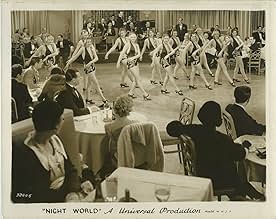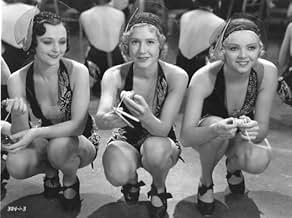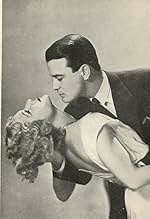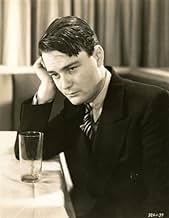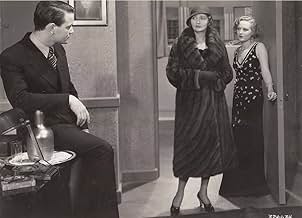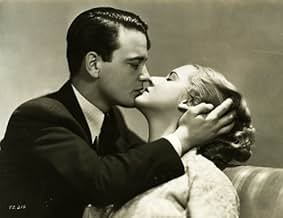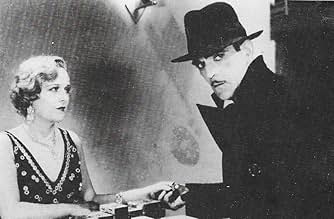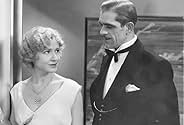Füge eine Handlung in deiner Sprache hinzuStory of the goings-on at a Prohibition-era nightclub.Story of the goings-on at a Prohibition-era nightclub.Story of the goings-on at a Prohibition-era nightclub.
- Regie
- Drehbuch
- Hauptbesetzung
Alice Adair
- Chorine
- (Nicht genannt)
Consuelo Baker
- Chorus Girl
- (Nicht genannt)
Frank Beal
- Bit
- (Nicht genannt)
Louise Beavers
- Maid
- (Nicht genannt)
Empfohlene Bewertungen
Yes, it's a cheap versions of GRAND HOTEL, but I think it works just fine. I'm going to disagree with some previous reviewers: I think Karloff is marvelous as the club owner, bringing a fierceness and bravado to it that others would lack. The rest of the cast is also good: Ayres, Marsh and Muse all register strongly. Hedda Hopper is indeed amazing as the bad mother. And George Raft stands out in his small part. A little of it is creaky and dated, but overall, I thought the camera-work was fluid and fine, the story moved fast and the characters were well-written. Nice little Busby Berkeley number near the top, too. Well worth checking out.
Poor Mae Clark was in loads of films yet is most known for getting a grapefruit in the kisser from James Cagney in 'Public Enemy.' So it's nice to see her in a part with a few more brains. She is just part of an odd mixed-salad of a cast. Some, like Boris Karloff as an awkwardly gangly night-club owner, and Bert Roach as a silly drunk, seem to be in strange waters. Others, like Lew Ayers and George Raft, get roles typical of their young careers. Though she has only one scene in this very short film, Hedda Hopper steals the show as the world's worst mother.
The only character to really warm to is The Doorman, Tim Washington (Clarence Muse). He is clearly in a horrible situation which those around pity at best and ignore at worst. So many African-American roles in the white films of the '30s are painful to watch, but Muse brings something special to this thankless part.
Cinematographer Merritt Gerstad shows an inventive eye both in the opening montage and in scenes that would otherwise be nothing to look at. And of course, we get brief Busby Berkeley numbers, which would never really work in a night club, but allowances must be made for Hollywood.
The only character to really warm to is The Doorman, Tim Washington (Clarence Muse). He is clearly in a horrible situation which those around pity at best and ignore at worst. So many African-American roles in the white films of the '30s are painful to watch, but Muse brings something special to this thankless part.
Cinematographer Merritt Gerstad shows an inventive eye both in the opening montage and in scenes that would otherwise be nothing to look at. And of course, we get brief Busby Berkeley numbers, which would never really work in a night club, but allowances must be made for Hollywood.
Boris Karloff runs a nightclub, unaware that his wife and one of his employees keep ducking into a closet for some reason ... wink wink, nod nod. Lew Ayres plays a drunken customer; his mother (Hedda Hopper) killed his father because she thought he was fooling around. Mae Clarke, who sings/dances at the nightclub, takes a shine to Ayres, which ticks off her current suitor (George Raft). There is a running gag involving the doorman (Clarence Muse) trying to phone his wife, who has been hospitalized.
This is essentially it. The film takes place over a few nights, so don't expect a soap opera. Jack LaRue shows up as a torpedo, Robert Emmett O'Connor plays a cop for the one millionth time, Byron Foulger plays a really, really, really gay customer, and Louise Beavers is onscreen for all of about five seconds.
It's interesting that the New York State censor board ordered some dialogue and scenes removed (notably at the climax), but the lines and scenes were intact in the version I saw.
Clarke is perky, adorable, and looks very cute in shorts. Muse comes off best as the most tragic figure in the film. The ending is crazy. Worth a look.
This is essentially it. The film takes place over a few nights, so don't expect a soap opera. Jack LaRue shows up as a torpedo, Robert Emmett O'Connor plays a cop for the one millionth time, Byron Foulger plays a really, really, really gay customer, and Louise Beavers is onscreen for all of about five seconds.
It's interesting that the New York State censor board ordered some dialogue and scenes removed (notably at the climax), but the lines and scenes were intact in the version I saw.
Clarke is perky, adorable, and looks very cute in shorts. Muse comes off best as the most tragic figure in the film. The ending is crazy. Worth a look.
You can certainly tell that "Night World" is a pre-code picture. It's set in a speakeasy--just the sort of sordid locale that wouldn't have been allowed after the new Production Code went into effect in mid-1934. Of course, by then alcohol was legal and speakeasies were a thing of the past anyways. The film is very much like a soap opera--with a variety of folks and love affairs going on during the course of the picture.
Several story lines are going on at the same time in this film and at then end, they all converge. One story is about the owners of the club, Happy (Boris Karloff) and Jill. However, Jill is cheating on her hubby and the way this story ends is pure dynamite. The main story involves a young man who's been drinking himself into oblivion (Lew Ayres). Why and his relationship with a girl who works in the club (Mae Clark) is fascinating. Finally, the doorman (Clarence Muse) has something going on with his sick wife. Again, all three stories converge at the end for a very slick and tense finale.
I rarely give short films like this such high scores. However, with this one, the writing was so good and the ending so enjoyable I highly recommend it. Thrilling and enjoyable throughout.
By the way, the dance numbers, though smaller in scale than his trademark choreography, were directed by Busby Berkeley.
Several story lines are going on at the same time in this film and at then end, they all converge. One story is about the owners of the club, Happy (Boris Karloff) and Jill. However, Jill is cheating on her hubby and the way this story ends is pure dynamite. The main story involves a young man who's been drinking himself into oblivion (Lew Ayres). Why and his relationship with a girl who works in the club (Mae Clark) is fascinating. Finally, the doorman (Clarence Muse) has something going on with his sick wife. Again, all three stories converge at the end for a very slick and tense finale.
I rarely give short films like this such high scores. However, with this one, the writing was so good and the ending so enjoyable I highly recommend it. Thrilling and enjoyable throughout.
By the way, the dance numbers, though smaller in scale than his trademark choreography, were directed by Busby Berkeley.
"Night World" is a short-ish film from Universal about a night in the Big Apple during prohibition, centering on a night club, Happys, run by, of all people, Boris Karloff.
This is the kind of rough film one associates with Warner Brothers, but instead it's the horror film studio of Universal.
We have a gay guy in the mens room, the depressed son of a man (Lew Ayres) whose father was just murdered by his mother (Hedda Hopper) and acquitted, the girlfriend of the murdered man telling his son what his mother is really like, a performer, Ruth (Mae Clarke) at the club trying to comfort him, a tough guy (George Raft) trying to pick up Ruth, the owner's (Karloff) wife being unfaithful to him, a shootout, and a philosophical doorman, Clarence Muse. Muse was a very accomplished black actor; I highly recommend reading his bio on IMDb.
Busby Berkeley did the choreography, utilizing the overhead camera to show his various patterns - not that the actual nightclub audience could see them. And the movie doesn't hide the fact that several of these chorines fool around.
Everyone is very good, with Muse, Clarke, and Ayres standouts.
If you want to see a racy precode, this is it.
This is the kind of rough film one associates with Warner Brothers, but instead it's the horror film studio of Universal.
We have a gay guy in the mens room, the depressed son of a man (Lew Ayres) whose father was just murdered by his mother (Hedda Hopper) and acquitted, the girlfriend of the murdered man telling his son what his mother is really like, a performer, Ruth (Mae Clarke) at the club trying to comfort him, a tough guy (George Raft) trying to pick up Ruth, the owner's (Karloff) wife being unfaithful to him, a shootout, and a philosophical doorman, Clarence Muse. Muse was a very accomplished black actor; I highly recommend reading his bio on IMDb.
Busby Berkeley did the choreography, utilizing the overhead camera to show his various patterns - not that the actual nightclub audience could see them. And the movie doesn't hide the fact that several of these chorines fool around.
Everyone is very good, with Muse, Clarke, and Ayres standouts.
If you want to see a racy precode, this is it.
Wusstest du schon
- WissenswertesMae Clarke was sick during most of the production of The Impatient Maiden (1932) and this film, which were made back-to-back. At the end of this film, she was so sick that her face swelled up and she was having hallucinations. She was able to go for detox treatments in Palm Springs and Pasadena.
- Zitate
'Happy' MacDonald: Never give a sucker an even break.
Ed Powell: I never give anybody an even break.
- VerbindungenFeatured in Die Universal-Story (1996)
Top-Auswahl
Melde dich zum Bewerten an und greife auf die Watchlist für personalisierte Empfehlungen zu.
- How long is Night World?Powered by Alexa
Details
- Erscheinungsdatum
- Herkunftsland
- Sprachen
- Auch bekannt als
- Mujeres que matan
- Drehorte
- Produktionsfirma
- Weitere beteiligte Unternehmen bei IMDbPro anzeigen
- Laufzeit
- 58 Min.
- Farbe
- Seitenverhältnis
- 1.37 : 1
Zu dieser Seite beitragen
Bearbeitung vorschlagen oder fehlenden Inhalt hinzufügen

